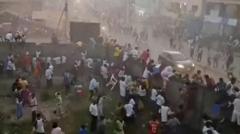A deadly crowd surge during a football match in Guinea has led to grave concerns about safety at sporting events, with over 135 fatalities reported by human rights organizations, primarily involving children. This shocking estimate vastly exceeds the official count, which stands at 56 deaths.
Tragedy Strikes as Over 135 Fans Killed in Guinea Stadium Crush

Tragedy Strikes as Over 135 Fans Killed in Guinea Stadium Crush
Human rights groups estimate unverified figures are far higher than government reports following a tragic incident in Nzérékoré.
The tragic event unfolded after a contentious refereeing decision triggered chaos among attendees. Panic ensued as fans rushed towards the sole small exit of the stadium, which resulted in a catastrophic crush. Eyewitness reports and statements from local families, mosques, and cemeteries have fueled the estimate of the death toll, while over 50 individuals remain unaccounted for.
In response to the outcry, Guinea’s military-led government has launched a judicial inquiry into the events surrounding the tragedy, with Justice Minister Yaya Kaïraba Kaba announcing that anyone spreading "unverified or malicious information" would face legal action. Government officials have publicly downplayed the activist-led death toll, stating the figures are provisional.
Reports from the scene indicated excessive use of tear gas, constricted by the stadium's limited escape routes. The collective of rights groups present attributed responsibility for the mounting casualties to both the event organizers and the ruling military junta, who conducted the tournament in honor of President Mamady Doumbouya.
Prime Minister Mamadou Oury Bah declared three days of national mourning as the nation grieves the loss. Meanwhile, the government continues to face scrutiny for failing to meet international standards for safety in football events, a situation that has led to Guinea being banned from hosting international matches. This tragedy raises alarming questions about the safety regulations and crowd management at sporting venues in Guinea and beyond.
In response to the outcry, Guinea’s military-led government has launched a judicial inquiry into the events surrounding the tragedy, with Justice Minister Yaya Kaïraba Kaba announcing that anyone spreading "unverified or malicious information" would face legal action. Government officials have publicly downplayed the activist-led death toll, stating the figures are provisional.
Reports from the scene indicated excessive use of tear gas, constricted by the stadium's limited escape routes. The collective of rights groups present attributed responsibility for the mounting casualties to both the event organizers and the ruling military junta, who conducted the tournament in honor of President Mamady Doumbouya.
Prime Minister Mamadou Oury Bah declared three days of national mourning as the nation grieves the loss. Meanwhile, the government continues to face scrutiny for failing to meet international standards for safety in football events, a situation that has led to Guinea being banned from hosting international matches. This tragedy raises alarming questions about the safety regulations and crowd management at sporting venues in Guinea and beyond.




















